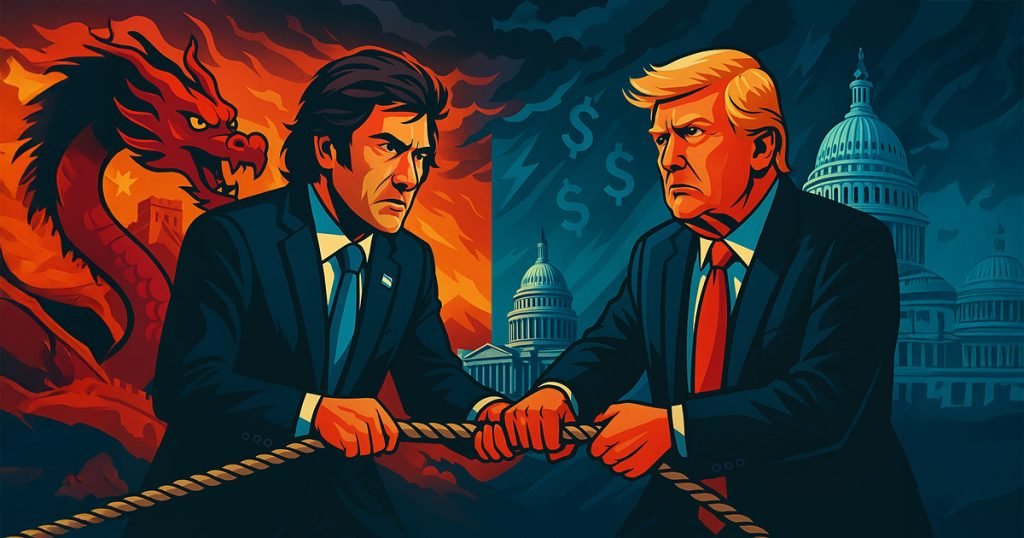Argentina’s Economic Dilemma: US Pressure, IMF Support, and Relations with China
In a pivotal move affecting Argentina’s economy, the United States has tied its support for Argentina’s International Monetary Fund (IMF) negotiations to President Javier Milei’s willingness to end the country’s longstanding currency swap agreement with China. This conditionality reflects growing concerns over China’s influence in Latin America and aligns with the US’s broader strategic interests in the region. Amidst this tense backdrop, Argentina is seeking a $20 billion loan from the IMF, a necessary lifeline for an economy that has a troubling history of defaulting on its obligations, having required IMF bailouts 22 times in the past. With inflation soaring up to 84.5%, though reduced from a staggering 211% at the end of last year, Milei’s government faces immense pressures to stabilize an economy that has struggled to regain its footing.
Mauricio Claver Carone, a prominent figure in US-Latin American relations and former advisor to Trump, has publicly insisted that Argentina must reorient its economic policies away from China and prioritize its relationship with the US. At a recent event in Miami, he recognized Milei as a "valued ally" but cautioned that Argentina’s future prosperity hinges on reducing Chinese economic influence. This stance underscores Washington’s commitment to countering Beijing’s growing clout in the region while offering financial assistance to partners willing to align with US interests.
The currency swap agreement in question, initiated in 2009, has acted as a critical buffer for Argentina’s economy by allowing its central bank to exchange currencies at a predetermined rate with China. This arrangement has provided essential access to Chinese renminbi, which can be converted into hard currency, assisting Argentina in meeting international debt obligations, including repayments to the IMF. However, the US views this agreement as a means for China to exercise considerable leverage over Argentina, complicating its economic sovereignty. Claver Carone describes the swap line as "extortionate," warning that its continued existence allows China to meddle in Argentina’s economic policies.
The ongoing economic crisis in Argentina has put immense pressure on Milei’s administration. Argentina faces multiple challenges, including rampant inflation, erratic currency fluctuations, and limited access to international capital markets. The currency swap with China, while criticized by the US, has provided crucial support during turbulent economic periods, offering Argentina a financial buffer and increasing its foreign reserves. Many analysts, including economist Arnaud Bertrand, argue that the US’s tactics may amount to economic bullying. They contend that the US is leveraging its influence over the IMF to manipulate Argentine policy alignments, reflecting geopolitical tensions that extend beyond mere financial considerations.
In his quest for economic reform, President Javier Milei has shown interest in dollarizing the Argentine economy—a strategy that would involve fixing the Argentine peso’s value to the US dollar. While dollarization could offer some economic stability, it likely requires extensive cooperation from both the US and the IMF, particularly in the context of potentially severing ties with China. The notion of dollarization emerges alongside Milei’s bullish stance on cryptocurrencies like Bitcoin, which he champions as a means of promoting currency competition and enhancing economic freedom.
To summarize, the complex interplay between Argentina’s negotiations with the IMF, its historical relationship with China, and current geopolitical dynamics underscores the difficulties facing President Milei’s administration. As Milei navigates these treacherous waters, it remains to be seen whether he can successfully distance Argentina from China’s economic grasp while obtaining the necessary support from the US and the IMF to address his country’s urgent economic challenges. The merging of economic stability with strategic foreign relations presents a challenging path forward for Argentina as it seeks to reclaim its economic autonomy amidst external pressures.


